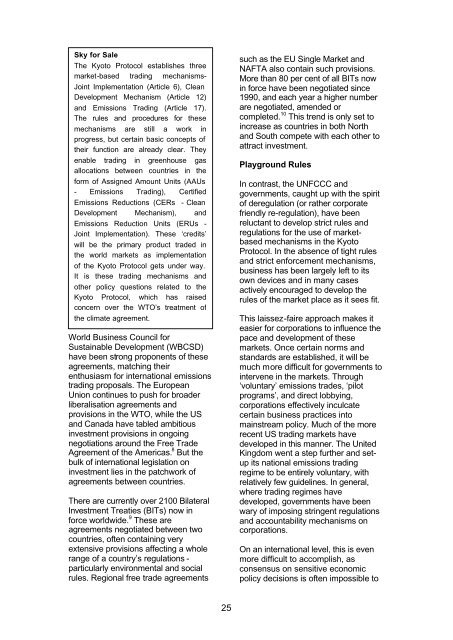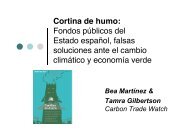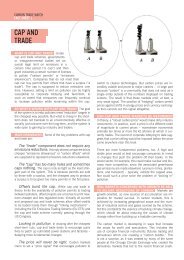The Sky is Not the Limit: - Carbon Trade Watch
The Sky is Not the Limit: - Carbon Trade Watch
The Sky is Not the Limit: - Carbon Trade Watch
- No tags were found...
Create successful ePaper yourself
Turn your PDF publications into a flip-book with our unique Google optimized e-Paper software.
<strong>Sky</strong> for Sale<strong>The</strong> Kyoto Protocol establ<strong>is</strong>hes threemarket-based trading mechan<strong>is</strong>ms-Joint Implementation (Article 6), CleanDevelopment Mechan<strong>is</strong>m (Article 12)and Em<strong>is</strong>sions Trading (Article 17).<strong>The</strong> rules and procedures for <strong>the</strong>semechan<strong>is</strong>ms are still a work inprogress, but certain basic concepts of<strong>the</strong>ir function are already clear. <strong>The</strong>yenable trading in greenhouse gasallocations between countries in <strong>the</strong>form of Assigned Amount Units (AAUs- Em<strong>is</strong>sions Trading), CertifiedEm<strong>is</strong>sions Reductions (CERs - CleanDevelopment Mechan<strong>is</strong>m), andEm<strong>is</strong>sions Reduction Units (ERUs -Joint Implementation). <strong>The</strong>se ‘credits’will be <strong>the</strong> primary product traded in<strong>the</strong> world markets as implementationof <strong>the</strong> Kyoto Protocol gets under way.It <strong>is</strong> <strong>the</strong>se trading mechan<strong>is</strong>ms ando<strong>the</strong>r policy questions related to <strong>the</strong>Kyoto Protocol, which has ra<strong>is</strong>edconcern over <strong>the</strong> WTO’s treatment of<strong>the</strong> climate agreement.World Business Council forSustainable Development (WBCSD)have been strong proponents of <strong>the</strong>seagreements, matching <strong>the</strong>irenthusiasm for international em<strong>is</strong>sionstrading proposals. <strong>The</strong> EuropeanUnion continues to push for broaderliberal<strong>is</strong>ation agreements andprov<strong>is</strong>ions in <strong>the</strong> WTO, while <strong>the</strong> USand Canada have tabled ambitiousinvestment prov<strong>is</strong>ions in ongoingnegotiations around <strong>the</strong> Free <strong>Trade</strong>Agreement of <strong>the</strong> Americas. 8 But <strong>the</strong>bulk of international leg<strong>is</strong>lation oninvestment lies in <strong>the</strong> patchwork ofagreements between countries.<strong>The</strong>re are currently over 2100 BilateralInvestment Treaties (BITs) now inforce worldwide. 9 <strong>The</strong>se areagreements negotiated between twocountries, often containing veryextensive prov<strong>is</strong>ions affecting a wholerange of a country’s regulations -particularly environmental and socialrules. Regional free trade agreementssuch as <strong>the</strong> EU Single Market andNAFTA also contain such prov<strong>is</strong>ions.More than 80 per cent of all BITs nowin force have been negotiated since1990, and each year a higher numberare negotiated, amended orcompleted. 10 Th<strong>is</strong> trend <strong>is</strong> only set toincrease as countries in both Northand South compete with each o<strong>the</strong>r toattract investment.Playground RulesIn contrast, <strong>the</strong> UNFCCC andgovernments, caught up with <strong>the</strong> spiritof deregulation (or ra<strong>the</strong>r corporatefriendly re-regulation), have beenreluctant to develop strict rules andregulations for <strong>the</strong> use of marketbasedmechan<strong>is</strong>ms in <strong>the</strong> KyotoProtocol. In <strong>the</strong> absence of tight rulesand strict enforcement mechan<strong>is</strong>ms,business has been largely left to itsown devices and in many casesactively encouraged to develop <strong>the</strong>rules of <strong>the</strong> market place as it sees fit.Th<strong>is</strong> la<strong>is</strong>sez-faire approach makes iteasier for corporations to influence <strong>the</strong>pace and development of <strong>the</strong>semarkets. Once certain norms andstandards are establ<strong>is</strong>hed, it will bemuch more difficult for governments tointervene in <strong>the</strong> markets. Through‘voluntary’ em<strong>is</strong>sions trades, ‘pilotprograms’, and direct lobbying,corporations effectively inculcatecertain business practices intomainstream policy. Much of <strong>the</strong> morerecent US trading markets havedeveloped in th<strong>is</strong> manner. <strong>The</strong> UnitedKingdom went a step fur<strong>the</strong>r and setupits national em<strong>is</strong>sions tradingregime to be entirely voluntary, withrelatively few guidelines. In general,where trading regimes havedeveloped, governments have beenwary of imposing stringent regulationsand accountability mechan<strong>is</strong>ms oncorporations.On an international level, th<strong>is</strong> <strong>is</strong> evenmore difficult to accompl<strong>is</strong>h, asconsensus on sensitive economicpolicy dec<strong>is</strong>ions <strong>is</strong> often impossible to25











